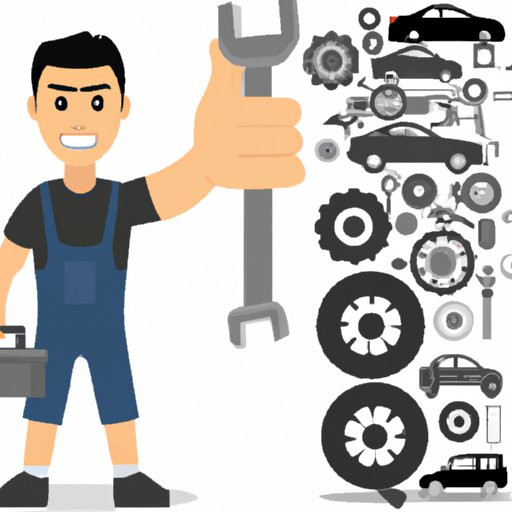
Introduction
Having mechanical skills and knowledge is essential for the successful operation and maintenance of a vehicle. Mechanics can diagnose and repair a wide range of issues that affect cars, trucks, and other modes of transportation. Their work keeps us moving, and it’s no surprise that a career in mechanics can be both rewarding and fulfilling.
Whether you’re a recent high school graduate or looking to make a career change, this article is for anyone interested in pursuing a career in auto repair. We’ll discuss the steps you should take to become a mechanic and highlight the various tools and skills you’ll need along the way.
10 Steps to a Career in Mechanics: A Beginner’s Guide
Step 1: Research and Assess Your Interest
Becoming a mechanic requires a significant investment of time and money. Take some time to research the various aspects of the auto industry to determine if this field is the right choice for you. Consider job duties, work environments, required skills, and potential earnings.
Step 2: Obtain a High School Diploma or GED
Most mechanic positions require a high school diploma or equivalent. Make sure to complete your schooling or obtain a GED before pursuing additional training or education.
Step 3: Consider a Trade or Vocational School
Attending a trade or vocational school is a great way to obtain the knowledge and skills necessary to enter the auto repair industry. These programs typically last between six months to two years and provide hands-on training and classroom instruction.
Step 4: Gain Experience Through Apprenticeship Programs
Many auto repair shops offer apprenticeship programs, allowing you to gain skills and experience under the guidance of a seasoned mechanic. These programs can range from six months to two years, and may even result in job placement after completion.
Step 5: Obtain Certifications
Obtaining certifications can boost your chances of being hired and increase your earning potential. The National Institute for Automotive Service Excellence (ASE) offers several certification programs for mechanics to demonstrate their skills and knowledge in specialized areas.
Step 6: Stay Up to Date with Current Technology
The auto repair industry is constantly evolving with new technology and advancements. Mechanics must stay up to date with these changes to remain competitive and deliver superior service to customers.
Step 7: Build Your Network
The auto repair industry heavily relies on building long-lasting customer relationships and networking with other professionals. Attend industry events, conferences, and seminars to meet new people and learn about new trends and advancements.
Step 8: Apply for Jobs
Once you have gained experience, certifications, and built your network, start applying for jobs. Consider both large and small auto repair shops and dealerships, and don’t forget to leverage your network to help you find opportunities.
From Grease Monkey to Certified Technician: The Journey to Becoming a Mechanic
Overview of the Process
The journey to becoming a mechanic can vary depending on your background and interests. The path to entry-level positions typically involves attending a trade or vocational school, gaining hands-on experience through apprenticeships, and obtaining certifications. However, some mechanics may choose to pursue a degree in automotive engineering or business to advance their careers.
Experience and Training Required
While a formal education is not always required, attending a trade or vocational school is a cost-effective way to obtain the necessary experience and training to enter the auto repair industry. These programs typically offer instruction on electrical systems, brakes, engines, and other critical components of vehicles.
Specializations
Auto repair technicians may choose to specialize in specific areas such as collision repair, diesel engines, or high-performance vehicles. Specializations often require additional certifications and training, but can lead to higher earning potential and job opportunities.
Job Outlook and Opportunities
According to the Bureau of Labor Statistics, the job outlook for auto repair technicians is projected to grow at an average rate of 4% between 2019 and 2029. While technological advancements may lead to a decline in some positions, the ongoing need for maintenance and repair of vehicles continues to drive demand for skilled mechanics.

DIY or Professional: How to Decide Whether or Not to Pursue Auto Mechanic Training
Pros and Cons of DIY Auto Repairs
While some DIY auto repairs can save money, attempting complex repairs without adequate knowledge and experience can lead to costly mistakes. Improper repairs can also put drivers and passengers at risk and may even void vehicle warranties.
Benefits of Going to School
Auto mechanic training provides essential knowledge and hands-on experience necessary to diagnose and repair vehicles safely and efficiently. Attending a trade or vocational school can also lead to job placement and networking opportunities.
Cost Analysis
The cost of attending a trade or vocational school can range from a few thousand dollars to tens of thousands. However, scholarships, grants, and financing options may be available to help offset these costs.
Potential Earnings
According to the Bureau of Labor Statistics, the median annual salary for auto repair technicians was $42,090 in 2019. Experienced technicians and those with specialized skills or certifications can earn significantly more.
Inside the Trade: What You Need to Know Before Becoming a Mechanic
Overview of the Auto Repair Industry
The auto repair industry is comprised of a wide range of service providers, from small independent shops to large dealerships and franchises. The industry is heavily influenced by technological advancements, customer needs, and industry regulations.
Job Duties and Skills Required
Auto repair technicians are responsible for diagnosing and repairing mechanical issues in vehicles. They must possess critical thinking skills, the ability to read and interpret technical schematics, and excellent communication skills. Mechanics must also be able to work with various tools and equipment safely and efficiently.
Work Environment and Schedule
Auto repair technicians work in a variety of environments, including repair shops, dealerships, and maintenance facilities. They must often work weekends, evenings, and holidays to accommodate customer needs, and their schedules may be unpredictable.
Common Challenges
The auto repair industry can be physically demanding and mentally challenging. Repairing complex systems and diagnosing multiple issues while working under tight deadlines can be stressful. Additionally, some mechanics must navigate customer service issues and negotiate pricing with suppliers and vendors.
Hitting the Hammer to the Wrench: Tools and Skills Every Mechanic Needs
Must-Have Tools for Auto Repair
Every mechanic needs a variety of hand tools, power tools, and diagnostic equipment to perform repairs safely and efficiently. Essential hand tools include pliers, wrenches, and screwdrivers, while power tools like cordless drills and air compressors can save valuable time and effort.
Key Skills Every Mechanic Should Develop
Auto repair technicians must possess critical thinking skills, the ability to multitask, and excellent communication skills to work effectively with customers, suppliers, and other mechanics. They must also know how to use a wide range of tools and diagnostic equipment safely and efficiently.
Additional Tools and Skills That Set Technicians Apart
Specialized certifications and training in areas like hybrid and electric vehicle repair, diesel engines, and air conditioning systems can set technicians apart and lead to higher-paying jobs and career advancement.
The Road to Certification: Navigating the Landscape of Automotive Mechanic Programs
Common Certification Programs Available
Various certification programs exist in the auto repair industry, including those offered by ASE, the National Automotive Technicians Education Foundation (NATEF), and the Automotive Youth Educational System (AYES).
Overview of ASE Certification
The National Institute for Automotive Service Excellence (ASE) offers several certification programs in areas like engine repair, brakes, suspension and steering, and air conditioning and electrical systems. Certification tests are rigorous and require the demonstration of knowledge and skills in a specific area of auto repair.
Requirements for Certification
To become ASE certified, mechanics must pass an exam and meet education and experience requirements. Recertification is required every five years to maintain certification.
Value of Certification
Certifications can increase earning potential, boost job opportunities, and demonstrate expertise in a particular area of auto repair. Customers may also seek certified mechanics to ensure their vehicles are repaired to the highest standards.
Turning Your Passion for Cars into a Livelihood: Tips from Professional Mechanics
Benefits of Working in the Auto Repair Industry
Auto repair technicians enjoy the satisfaction that comes with diagnosing and repairing complex systems, the ability to work with various tools and equipment, and the opportunity to build long-lasting customer relationships.
Insight from Established Professionals
Experienced mechanics recommend staying up to date with technology and industry regulations, leveraging networking opportunities, and continually seeking training and certifications to advance your career.
Tips for Achieving Career Success
Successful mechanics advise focusing on customer service and safety, developing specialized skills, and continuously seeking new opportunities for personal and professional growth.
Conclusion
Becoming a mechanic requires dedication, hard work, and ongoing education and training. However, a career in the auto repair industry can be rewarding and fulfilling, offering the satisfaction of diagnosing and repairing complex systems while earning a competitive salary. By following the steps outlined in this article, you can successfully navigate the path to becoming a mechanic and achieve career success in the auto repair industry.





